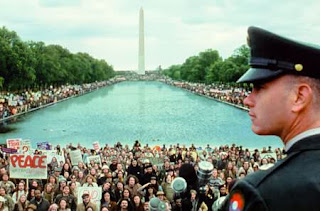 |
| What is going on in there? |
Was it a comedy?
If the answer is yes, then it was more than likely directed by Todd Solondz, a man who has made a living creating some of the most offensive comedies ever made. And when I say offensive, I don't mean that the content is necessarily atrocious or that any particular group of people is getting picked on. I mean it in the way that the first line of this article means it. Todd Solondz wants to hurt your feelings. And how does he do this, you ask?
It's pretty simple, actually. He just takes situations we have all been through and displays them in the way that we remember them. Solondz doesn't have much interest in how things actually were, and if you really think about it, neither do we (See: Forrest Gump). Solondz, instead, shows us the things about our childhood that we have tried to forget, and in the process of forgetting we have ended up making far worse in our minds. Yet, somehow, when confronted with these projected atrocities of our childhood, the scenes inexplicably make us do this instead of this. What makes us do that? Why does this guy have the gall to make us laugh at a movie that includes a scene where a little boy confronts his father about...something. How could he possibly call this scene a roaring rampage of delicious comedy?
I don't think he does, actually.
What Solondz is doing here is making you uncomfortable, and then interjecting each scene with something funny so that the audience can breathe. It's actually pretty scientific. I mean, this style of comic relief has been around for centuries. (there's evidence of it in Shakespeare's plays) Solondz's deeply troubling scenes, interspersed with humor, wouldn't find too much trouble working their way into Hamlet.
Now before you get the wrong idea, I'm not comparing the previously indicated scenes to Shakespeare, but I do think that the same logic is being used here. However, the trouble with Solondz finding mainstream success (other than his total lack of enthusiasm for mainstream cinema) is that he does not make genre specific films. Probably his most straightforward comedy, Welcome to the Dollhouse, is still (as you saw in the bathroom scene) pretty dark for a comedy. I mean, in a movie where the comedic punchline is that the protagonist is constantly being threatened with rape, you're not going to find too many guffaws in the room.
So are they comedies? Well, to put it simply, yes and yes?
But this is a kind of comedy that seems to be going out of fashion. Strangely enough, I think the last time we saw real mainstream success in this kind of comedy, the kind that shows you a mirror and then laughs hysterically at how dumb you are, is when the first Meet the Parents movie came out. The sequels seem to have dumbed down the awkwardness, but they may still marginally apply. Yet Solondz is taking that basic structure and creating films with almost merciless attacks on every person of every belief and background.
He is trying to offend. He is stirring you up. The films he makes challenge us to look at ourselves and laugh at how ridiculous we can be. While I would agree that using pedophilia (in no less than four movies!) as a consistent plot point is a little over-the-top, I would also suggest that it is the smaller things that he is really trying to show us, and he is merely using these large, blanket issues to distance the characters just enough to make us feel safe in our skin.
When we're too busy feeling disgusted by the pedophilia and narcissism of his characters, Solondz throws in difficult break up scenes, characters who are casually racist, homophobic, exploitative, and incapable of finding joy in others. In what is perhaps his most successful film, Happiness, Solondz introduces his audience to an ensemble of characters with serious social issues, and the film ends with no real resolutions to any of them.
It's nice to see a filmmaker who clearly has no filter and appears to see everything with clear eyes. It's also nice to know that that filmmaker is, at his heart, a comedian who is showing us these things to help us, not to hurt us. Well, not entirely to hurt us. As Helen says to Joy in the final moments of the trailer for Happiness, "Don't worry, I'm not laughing at you, I'm laughing with you," I feel that Todd Solondz is saying the same thing with his films.
Only...What does Joy say in return?
[If you haven't seen any of Todd Solondz's films, I would suggest viewing them in this order: Welcome to the Dollhouse, Storytelling, Happiness, Life During Wartime, Palindromes. Here is a short list of similar filmmakers: Luis Bunuel, Bobcat Goldthwait, Jody Hill, Miranda July, Jim Jarmusch, and the Mid-Period works of Robert Altman]


















